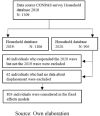Trends in mental health before and after the onset of the COVID-19 pandemic: a longitudinal survey of a conflict-affected population in Colombia
- PMID: 38317169
- PMCID: PMC10845752
- DOI: 10.1186/s13033-024-00621-1
Trends in mental health before and after the onset of the COVID-19 pandemic: a longitudinal survey of a conflict-affected population in Colombia
Abstract
Background: Focusing on the Meta region in Colombia, we investigated the relationship between mental health, the COVID-19 pandemic, and social determinants of health influenced by over five decades of civil conflict. We studied the post-2016 peace agreement trends in mental health for the population of Meta, before and after the local onset of the pandemic.
Method: We conducted three rounds of a longitudinal health survey in years 2018 with N = 1309 (Women = 709; Men = 600); 2019 with N = 1106 (Women = 597; Men = 509); and 2020 with N = 905 (Women = 499; Men = 406). We measured mental health through the Self-Report Questionnaire (SRQ-20), investigating population trends in the average SRQ score and SRQ-positive frequency (SRQ + , indicating positive tendency towards experiencing mental health disorders).
Results: Between 2018 and 2020, there were reductions in the mean SRQ-20 score by 1.74 points (95% CI -2.30 to -1.18) and in SRQ + frequency by 15 percentage points (95% CI -21.0 to -9.0) for the Meta population. Yet specific subgroups have become more vulnerable to mental illness during the pandemic, for example older age groups (e.g., increase in mean SRQ score among over 60 s by 2.49 points, 95% CI 0.51 to 4.46) and people living with children younger than five years-old (e.g., increase in mean SRQ score by 0.64 points, 95% CI 0.07 to 1.20). Increased mental health vulnerability among specific subgroups may be related to differences in the likelihood of knowing people who tested positive for COVID-19 or died from itf having been in quarantine.
Conclusion: Our findings support the importance of public policies in Colombia (and other low- and middle-income countries) that address the social determinants of mental illness whose influence was likely exacerbated by the pandemic, including persistent job insecurity leading to work and financial pressures, and inadequate support networks for isolated individuals and vulnerable caregivers.
Keywords: COVID-19; Colombia; Conflict; Health; Mental health; SRQ.
© 2024. The Author(s).
Conflict of interest statement
The authors declare that they have no competing interests.
Figures
Similar articles
-
Mental health disorders in population displaced by conflict in Colombia: Comparative analysis against the National Mental Health Survey 2015.Rev Colomb Psiquiatr (Engl Ed). 2023 Apr-Jun;52(2):121-129. doi: 10.1016/j.rcpeng.2021.04.007. Epub 2023 Jul 13. Rev Colomb Psiquiatr (Engl Ed). 2023. PMID: 37453820 English, Spanish.
-
Mental Health Disorders in Population Displaced by Conflict in Colombia: Comparative Analysis against the National Mental Health Survey 2015.Rev Colomb Psiquiatr (Engl Ed). 2021 Jul 7:S0034-7450(21)00089-5. doi: 10.1016/j.rcp.2021.04.012. Online ahead of print. Rev Colomb Psiquiatr (Engl Ed). 2021. PMID: 34246471 English, Spanish.
-
The COVID-19 pandemic and maternal mental health in a fragile and conflict-affected setting in Tumaco, Colombia: a cohort study.Lancet Glob Health. 2021 Aug;9(8):e1068-e1076. doi: 10.1016/S2214-109X(21)00217-5. Epub 2021 Jun 24. Lancet Glob Health. 2021. PMID: 34175006 Free PMC article.
-
A light of hope? Inequalities in mental health before and after the peace agreement in Colombia: a decomposition analysis.Int J Equity Health. 2021 Jan 19;20(1):39. doi: 10.1186/s12939-021-01381-x. Int J Equity Health. 2021. PMID: 33468165 Free PMC article.
-
Mental Health of Medical Students Before and During COVID-19 Pandemic: a 3-Year Prospective Study.Med Sci Educ. 2022 Jun 29;32(4):873-881. doi: 10.1007/s40670-022-01580-3. eCollection 2022 Aug. Med Sci Educ. 2022. PMID: 35789940 Free PMC article.
Cited by
-
Mental health and catastrophic health expenditures in conflict-affected regions of Colombia before and during COVID-19: an inequalities perspective.Int J Equity Health. 2025 May 22;24(1):146. doi: 10.1186/s12939-025-02485-4. Int J Equity Health. 2025. PMID: 40405222 Free PMC article.
References
-
- World Health Organization. COVID 19 Public Health Emergency of International Concern (PHEIC). Global research and innovation forum: towards a research roadmap. 2020.
-
- De la Hoz-Restrepo F, Alvis-Zakzuk NJ, de la Hoz-Gomez JF, de la Hoz A, del Corral LG, Alvis-Guzmán N. Is Colombia an example of successful containment of the 2020 COVID-19 pandemic? A critical analysis of the epidemiological data, March to July 2020. Int J Infect Dis. 2020;99:522–529. doi: 10.1016/j.ijid.2020.08.017. - DOI - PMC - PubMed
-
- Holingue C, Badillo-Goicoechea E, Riehm KE, Veldhuis CB, Thrul J, Johnson RM, et al. Mental distress during the COVID-19 pandemic among US adults without a pre-existing mental health condition: findings from American trend panel survey. Prev Med. 2020;139:106231. doi: 10.1016/j.ypmed.2020.106231. - DOI - PMC - PubMed
-
- Pan K-Y, Kok AAL, Eikelenboom M, Horsfall M, Jörg F, Luteijn RA, et al. The mental health impact of the COVID-19 pandemic on people with and without depressive, anxiety, or obsessive-compulsive disorders: a longitudinal study of three Dutch case-control cohorts. Lancet Psychiatry. 2021;8(2):121–129. doi: 10.1016/S2215-0366(20)30491-0. - DOI - PMC - PubMed
Grants and funding
LinkOut - more resources
Full Text Sources


